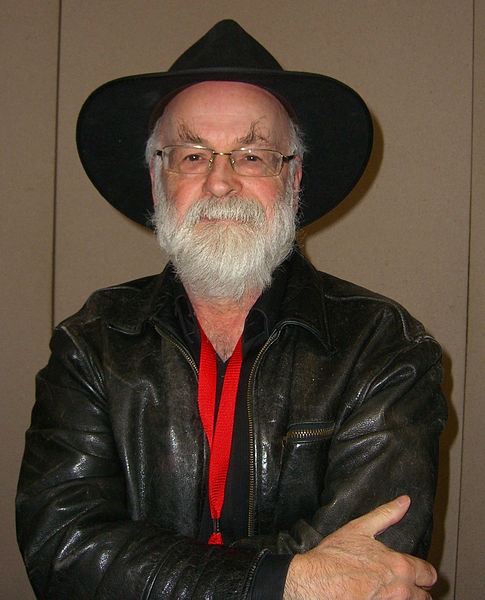On this date in 1948, Terence David John Pratchett was born in Buckinghamshire, England. He enjoyed reading, especially science fiction, fantasy, myth and ancient history. He has said that from a young age he was skeptical about Christianity and came to the conclusion that there was no God. He won many awards, including the Carnegie Medal for The Amazing Maurice and Educated Rodents (2001), and was knighted in 2009 for his services to literature. Several of his books have been adapted as movies for television. Pratchett’s first novel, Carpet People, a children’s fantasy, was published in 1971.
Pratchett is best known for his “Discworld” novels, a fantasy series tied together not by characters or plot but by the setting of the Discworld, a flat world sitting on the backs of four elephants standing on the back of a giant turtle swimming through space. The first book in this series, The Color of Magic, a fantasy adventure starring a hapless wizard parodying many conventions of the genre, was published in 1983, and the 38th, I Shall Wear Midnight, a coming-of-age story featuring a strong young witch battling prejudice, was published in 2010. The Discworld, like many fantasy worlds, features gods who occasionally interfere directly in events or feature as characters in some way.
Throughout his work, Pratchett questions religion in many different ways, pointing out religious hypocrisy while at the same time illustrating how different the world would be if God, or any gods, were real. The 1992 Discworld novel Small Gods shows the god Om visiting his worshipers, and being deeply dissatisfied with the direction in which his church has gone. Good Omens (1990), co-written with fellow British fantasy author Neil Gaiman, deals with Christian mythology and the biblical book of Revelation.
It begins with an angel and a demon conversing outside the Garden of Eden and questioning God’s motives regarding the Tree of the Knowledge of Good and Evil. It ends with the 10-year-old anti-Christ, Adam, contemplating the raid of a neighbor’s orchard and thinking, “There never was an apple … that wasn’t worth the trouble you got into for eating it.” Pratchett said, “I read the Old Testament all the way through when I was about 13 and was horrified.” (UK Daily Mail, June 21, 2008)
In 2007, Pratchett was diagnosed with early-onset Alzheimer’s, but continued to write and publish new books, albeit at a slower pace. He made many public statements in support of the right to die and talked openly about his Alzheimer’s experience, including his wish to take his own life before his disease was critical. He died of Alzheimer’s complications at age 66. (D. 2015)
PHOTO: by © Luigi Novi / Wikimedia Commons under CC 3.0.


